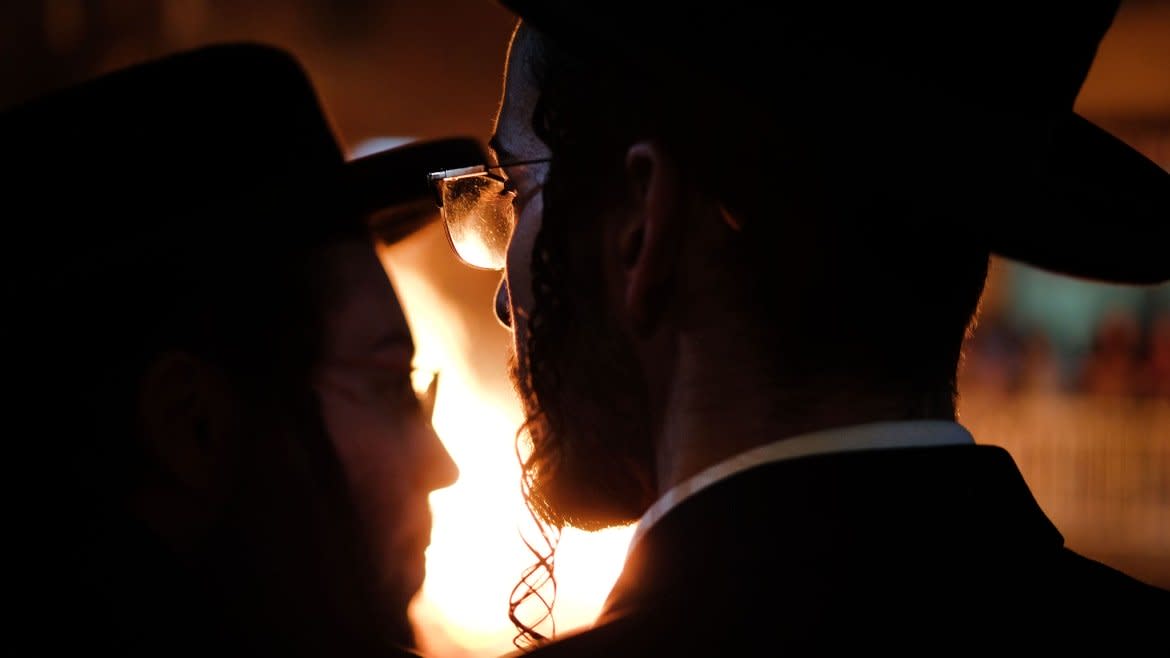All-American Decency Is the Antidote to Anti-Semitism

It took two killers shooting up a Jersey City kosher-mart and one machete-wielding maniac invading a rabbi’s house in Monsey to reteach the old lesson that Jew-hatred is the most plastic hatred—adaptable, durable, artificial, and frequently toxic.
Until then, even most American Jews kept folding the fight against anti-Semitism into the partisan war over Donald Trump.
Yet reducing Jew-hatred to yet another partisan hot potato undermines the moral clarity needed to fight it. It also hides the best countermove against bigotry in America: Don’t emphasize what’s wrong with America—appeal to what’s right about America.
The assaults on Orthodox Jews in Brooklyn, Jersey City, Monsey broke the left-right paradigm. This Jew-hatred of the street doesn’t stem from white nationalism online or anti-Israel progressivism on campus, because anti-Semitism is far more capacious. It targets Jews, be they left or right, capitalist or Marxist, religious or non-religious, Zionist or non-Zionist
Hatred is contagious. Today, internet bullying shows how copycatting can escalate from tweets to manifestos to attacks. But history teaches that decency is contagious, too. Individuals step up, trusting others to back them, and still others to mimic their good behavior. That’s why, in fighting hatred, a society needs clear red lines that transcend politics.
Many American Jews’ moral confusion today mocks a proud history of fighting bigotry clearly, courageously, creatively. American Jews are the heirs of Cesar J. Kaskel, who lobbied President Abraham Lincoln to rescind General U.S. Grant’s General Order Number 11 in 1862 expelling “Jews as a class” from parts of the south during the Civil War. They should learn from Aaron Sapiro, who sued the automaker Henry Ford for spreading anti-Semitic libels. Embarrassed, eventually forced to apologize, Ford shuttered his hate-spewing Dearborn Independent in 1927.
Follow Betty Friedan and Letty Cobin Pogrebin, too, who refused to let anti-Semites hijack the feminist agenda in the 1970s and 1980s. Realizing that the fights against sexism and Jew-hatred reinforced one another, Friedan declared: “all human rights are indivisible.” Similarly, Pogrebin would recall that although Israelis were usually targeted at these conferences, “I knew the arrow also was meant for me.” Rebuffing false claims of ideological solidarity used to mask the rank bigotry, Friedan wrote that “to feminists who hate Israel, I was not a woman, I was a Jewish woman.” Launching a deeper Jewish journey, Pogrebin wondered: “Why be a Jew for them if I am not a Jew for myself?”
Although some Jews have been raised on a steady woe-is-me diet emphasizing Jewish victimhood, others of us were raised on stories of Jewish heroes, not just in the past, not just in Israel, but next door, sometimes in our own families. One of my best friends as a teenager, Anita Besdin, enjoyed telling us how her father, Irving Besdin, was singled out during World War II as an exemplary soldier to be honored by George S. Patton, a notorious anti-Semite. When General Patton saluted Corporal Besdin, this proud kid from Syracuse, New York, blurted out, “and I’m a Jew too!”
My father, Bernard Dov Troy, helped smuggle machine gun parts out of New York in large fruit cans and Matzah boxes, to circumvent America’s arms blockade and help Jews defend themselves in Palestine in the late 1940s. World War II veterans, both Jewish and non-Jewish, provided the weapons, relinquishing their souvenirs from the European and Pacific fronts to help avert a second Holocaust in the Middle East.
These honest Americans had no trouble recognizing the enemy, regardless of the anti-Semite’s ideology or stature. Cesar Kaskel risked being accused of disloyalty during the Civil War; Freidan and Pogrebin broke ranks with “the sisterhood”; Besdin confronted a legendary warrior. And these proud Jews resisted the anti-Semite’s divisive tricks, rejecting the supposed rationale for the hatred while defending personal dignity, the Jewish people, and human rights.
Most important, these successes banked on the secret American ingredient: what we used to call “all-American decency.” We knew there were more Lincolns than Fords. Each one of these heroes trusted allies—Jewish and non-Jewish—to have their backs.
In fact, most stories of American anti-Semitism ended with redemptive happy endings. Grant regretted his anti-Semitic order almost immediately. As president, Grant appointed more Jews than ever before to public office, and he became the first president to sit through an entire synagogue service —a remarkable act of repentance. Henry Ford’s grandson and heir, Henry Ford II, nicknamed “Hank the Deuce,” presented Israel’s first president Chaim Weizmann with a Ford Lincoln Cosmopolitan, contributed generously to the United Jewish Appeal’s first Christian Committee Campaign for Israel, and opened a Ford assembly plant in Israel, declaring all-American style:“Nobody’s gonna tell me what to do.”
Today, the few American Jews who know some of these stories, usually emphasize American indecency: Grant’s ban, Ford’s hatred, Patton’s contempt. That helps some compete in the perverse who-suffered-more victimization sweepstakes on campuses and elsewhere. But decency remains the best response to indecency.
As we celebrate Martin Luther King's birthday, let's remember that he didn't see America as inherently racist—he saw racism as inherently unAmerican. He understood the value of venerating the Constitution and appealing to what’s best in Americans, that’s how we stretch.
These heroic American Jews did too, as did their partners—like most Americans, now, as then.
Gil Troy is a Distinguished Scholar of North American History at McGill University. The author of nine books on American history, his latest book is The Zionist Ideas.
Get our top stories in your inbox every day. Sign up now!
Daily Beast Membership: Beast Inside goes deeper on the stories that matter to you. Learn more.


